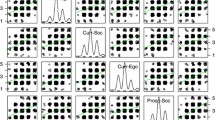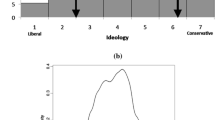Abstract
I argued in chapter 1 that the inclusion of altruistic benefits in the decision calculus solves the problem of voting in rational choice theory, as shown by Downs (1957). However, I did not show either that voting is an equilibrium strategy or that a high turnout results when altruism is included. In this chapter, I present an empirical test of the hypothesis that uses the 1995 NES Pilot Study, because it includes several measures of “humanitarianism.” By integrating this survey with the 1994 NES election survey, I am able to present evidence that altruism does, in fact, play a key role in the decision to vote.
Access this chapter
Tax calculation will be finalised at checkout
Purchases are for personal use only
Preview
Unable to display preview. Download preview PDF.
Similar content being viewed by others
Copyright information
© 2015 Richard Jankowski
About this chapter
Cite this chapter
Jankowski, R. (2015). Why Vote? The Evidence. In: Altruism and Self-Interest in Democracies. Palgrave Macmillan, New York. https://doi.org/10.1057/9781137391537_3
Download citation
DOI: https://doi.org/10.1057/9781137391537_3
Publisher Name: Palgrave Macmillan, New York
Print ISBN: 978-1-349-68049-8
Online ISBN: 978-1-137-39153-7
eBook Packages: Palgrave Political Science CollectionPolitical Science and International Studies (R0)




